
Ecological Processes
metrics 2024
Innovating ecological research for global sustainability.
Introduction
Ecological Processes, published by Springer, is a premier open-access journal dedicated to advancing the understanding of ecological modeling and ecological processes. With a significant impact factor evidenced by its prestigious Q1 ranking in both Ecological Modeling and Ecology categories, as well as impressive Scopus rankings—41st out of 461 in Environmental Science and 7th out of 41 in Ecological Modeling—this journal is a vital resource for researchers, professionals, and students alike. Established in 2012 and operating under an open-access framework since its inception, Ecological Processes strives to provide a platform for high-quality research that addresses critical ecological challenges, ensuring wide dissemination of its articles to a global audience. The journal's focus encompasses various aspects of ecological modeling as well as practical implications for managing natural resources, making it an essential publication for anyone interested in the dynamics of ecological systems and their implications for sustainability.
Metrics 2024
 -
- 4.60
4.60 5.00
5.00 -
-Metrics History
Rank 2024
IF (Web Of Science)
JCI (Web Of Science)
Quartile History
Similar Journals

OIKOS
Innovative insights into ecological interactions and behaviors.OIKOS is a leading journal dedicated to the field of Ecology, Evolution, Behavior, and Systematics, published by WILEY in the United Kingdom. Since its inception in 1973, OIKOS has established itself as a vital platform for researchers seeking to advance their understanding of ecological interactions and evolutionary processes, with its impact reflected in its prestigious Q1 classification in the 2023 Scopus rankings. The journal's dedication to high-quality research is exemplified by its robust ranking of #106 out of 721 in the relevant categories, situating it within the top 15% of journals globally. With a commitment to disseminating influential findings, OIKOS encourages the open exchange of ideas among a diverse range of scholars, making it an essential resource for academics, professionals, and students alike. Whether you are interested in innovative ecological theories or applied research with real-world implications, OIKOS provides a rich repository of knowledge to inform and inspire your work.
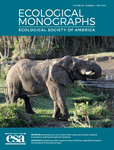
ECOLOGICAL MONOGRAPHS
Advancing ecological understanding through rigorous research.ECOLOGICAL MONOGRAPHS, published by WILEY, stands as a premier journal in the field of ecology, evolution, behavior, and systematics, with an impressive impact factor and ranking in the 96th percentile among its peers. Since its inception in 1974, this journal has offered comprehensive insights and advanced knowledge on ecological phenomena, serving as a vital resource for researchers, professionals, and students alike. With its commitment to publishing high-quality, peer-reviewed articles, it operates within the esteemed Q1 category of ecology, solidifying its reputation as a leading platform for innovative research. Though not available as open access, ECOLOGICAL MONOGRAPHS ensures broad reach and visibility through its rigorous editorial standards and substantial scholarly contributions. As it continues to aggregate vital ecological data and synthesize research across multiple converged years, this journal remains invaluable for those dedicated to understanding complex ecological interactions and their implications for environmental policy and management.
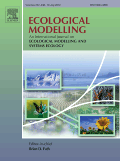
ECOLOGICAL MODELLING
Illuminating the intricate web of ecological interactions.ECOLOGICAL MODELLING, published by Elsevier, is a premier international journal dedicated to advancing the field of ecological modeling. Established in 1975, this reputable journal has consistently served as a vital platform for researchers, professionals, and students alike, reflecting the dynamic nature of ecological research and its applications. With an impressive impact factor, currently placing it in the Q2 quartile for Ecological Modeling and in the prestigious Q1 quartile for Ecology, ECOLOGICAL MODELLING ranks prominently in the scientific community, positioned at #91/461 in Environmental Science - Ecology and #14/41 in Environmental Science - Ecological Modeling according to Scopus rankings. The journal seeks to publish high-quality, interdisciplinary research that enhances understanding and predictive capacity regarding ecological processes and their integration into real-world applications. While the journal does not currently offer open access, it remains a cornerstone for knowledge dissemination within the ecological community, ensuring that your valuable research reaches a wide audience.

Nature Conservation Research
Fostering innovation in the fight against biodiversity loss.Nature Conservation Research is a prominent open-access journal that has been dedicated to advancing the field of conservation science since its inception in 2016. Published by the SARANSK FOND PODDERZKI & RAZVITIA ZAPOVEDNYH in the Russian Federation, this journal serves as a vital platform for researchers, professionals, and students alike, providing critical insights into ecological and environmental issues. With an impressive impact factor and ranked in the second quartile across multiple categories—including Agricultural and Biological Sciences, Earth and Planetary Sciences, Ecology, and Nature and Landscape Conservation—Nature Conservation Research stands at the forefront of impactful scientific discourse. The journal not only aims to disseminate high-quality research findings but also seeks to foster collaboration and innovation in conservation practices globally. By ensuring open access to its content, it promotes widespread dissemination of knowledge, crucial in the fight against biodiversity loss and environmental degradation. Researchers and practitioners contributing to the journal will find themselves at the convergence of science and conservation efforts, paving the way for sustainable ecosystem management.
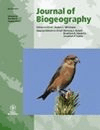
JOURNAL OF BIOGEOGRAPHY
Advancing Knowledge in Ecological Patterns and ProcessesJOURNAL OF BIOGEOGRAPHY, published by Wiley, stands as a premier multidisciplinary platform for the publication of high-quality research in the fields of biogeography and ecology. With an impressive Q1 ranking in both Ecology and Ecology, Evolution, Behavior and Systematics categories for 2023, this journal is recognized for its significant contribution to understanding ecological patterns and processes across geographic spaces. The journal, which has been in circulation since 1948 with a continuous production from 1979 to 2024, features rigorously peer-reviewed articles, critical reviews, and essential data that illuminate the dynamic interactions between organisms and their environments. While this journal does not currently offer open access options, it remains a valuable resource for researchers, professionals, and students seeking to explore the latest discoveries and theoretical advances in biogeography. With impressive Scopus rankings, including a 73rd position out of 721 in Agricultural and Biological Sciences and a 53rd position out of 461 in Environmental Science, the JOURNAL OF BIOGEOGRAPHY is indispensable for those aiming to advance their understanding of ecological frameworks and biodiversity conservation.

FOLIA GEOBOTANICA
Exploring the intricate connections between flora and fossil.FOLIA GEOBOTANICA, published by Springer, is a distinguished journal dedicated to advancing the fields of Paleontology and Plant Science through the dissemination of high-quality research. With an ISSN of 1211-9520 and an E-ISSN of 1874-9348, this journal has been pivotal in providing a platform for innovative studies from 1994 to 2024. Notably, FOLIA GEOBOTANICA holds a Q3 ranking in Paleontology and a Q2 ranking in Plant Science as of 2023, affirming its relevance and contribution to the scholarly community. The journal is located in the Netherlands at VAN GODEWIJCKSTRAAT 30, 3311 GZ DORDRECHT, and is not an Open Access publication, ensuring comprehensive review processes and scholarly integrity. With Scopus rankings that place it in the 50th percentile for Plant Science and 46th for Paleontology, FOLIA GEOBOTANICA continues to attract researchers, professionals, and students who are keen to explore the intricacies of plant ecology and fossil records, thereby fostering a deeper understanding of ecological and evolutionary patterns.

Inland Water Biology
Unveiling the Secrets of Aquatic LifeInland Water Biology is a distinguished peer-reviewed journal published by MAIK NAUKA/INTERPERIODICA/SPRINGER, focusing on the intricate interactions within freshwater ecosystems. With its ISSN (1995-0829) and E-ISSN (1995-0837), this journal has established itself as an essential resource for researchers and professionals in the fields of Aquatic Science and Ecology, evidenced by its consistent ranking in the Q3 category for both disciplines in 2023. Covering a wide array of topics related to the biology of inland waters, the journal aims to disseminate cutting-edge research findings and theoretical advancements that contribute to the understanding of aquatic environments and their ecological significance. Although it does not offer open access, its impact in the academic community is noteworthy, ensuring that published works undergo rigorous peer review. Researchers, professionals, and students alike will find valuable insights and innovative approaches within its pages, making Inland Water Biology a vital addition to their academic endeavors.
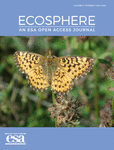
Ecosphere
Connecting researchers to drive ecological discovery.Ecosphere is a leading open-access journal published by WILEY, dedicated to advancing research in the fields of ecology, evolution, behavior, and systematics. Established in 2010 and headquartered in the United States, this innovative journal provides a platform for the exchange of cutting-edge scientific knowledge and discovery, fulfilling its mission to enhance our understanding of ecological systems and their interactions. With a prestigious impact factor reflecting its commitment to high-quality research, Ecosphere is ranked Q1 in both Ecology and Ecology, Evolution, Behavior, and Systematics for 2023, further solidifying its prominence in the scientific community. The journal's scope includes a wide array of topics related to environmental science, making it an essential resource for researchers, professionals, and students aiming to stay at the forefront of ecological research. It offers comprehensive open access options, ensuring that groundbreaking findings are readily available to a global audience, thus fostering collaboration and innovation in the field.

Folia Oecologica
Advancing Ecological Knowledge for a Sustainable Future.Folia Oecologica is a distinguished open-access journal published by WALTER DE GRUYTER GMBH, focusing on critical research in the fields of agricultural and biological sciences, ecology, and forestry. Established as a vital platform for the dissemination of knowledge, this journal has been providing free access to its valuable content since 2017, catering to an international audience engaged in environmental and ecological studies. With its ISSN 1336-5266 and E-ISSN 1338-7014, Folia Oecologica has earned notable ranks in Scopus, placing it in the 62nd percentile for Agricultural and Biological Sciences and the 50th percentile for Environmental Science. The journal's commitment to high-quality research is reflected in its positions in the Q2 and Q3 quartiles across various categories in 2023. As it converges years from 2006 to 2024, Folia Oecologica continues to foster scholarly dialogue and collaboration among researchers, professionals, and students, making significant contributions to the understanding and preservation of our ecological systems.
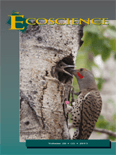
ECOSCIENCE
Pioneering research for a greener planet.ECOSCIENCE, published by Taylor & Francis Inc, stands as a prominent journal in the fields of Ecology and Environmental Science, recognized for its commitment to advancing knowledge since its inception in 1994. With an ISSN of 1195-6860 and an E-ISSN of 2376-7626, the journal caters to a diverse audience of researchers, professionals, and students passionate about ecological and environmental issues. In 2023, it achieved Q2 and Q3 rankings in the Scopus category of Ecology and Evolution, Behavior and Systematics, reflecting its significance within the academic community. Moreover, ECOSCIENCE occupies notable positions in Scopus rankings, including Rank #324 in Agricultural and Biological Sciences and Rank #210 in Environmental Science, symbolizing its role as a catalyst for disseminating high-quality research. Although currently not open access, the journal's multifaceted scope encourages in-depth discussions on ecological diversity, conservation strategies, and sustainable practices, making it an invaluable resource for those engaged in ecological research and practice.